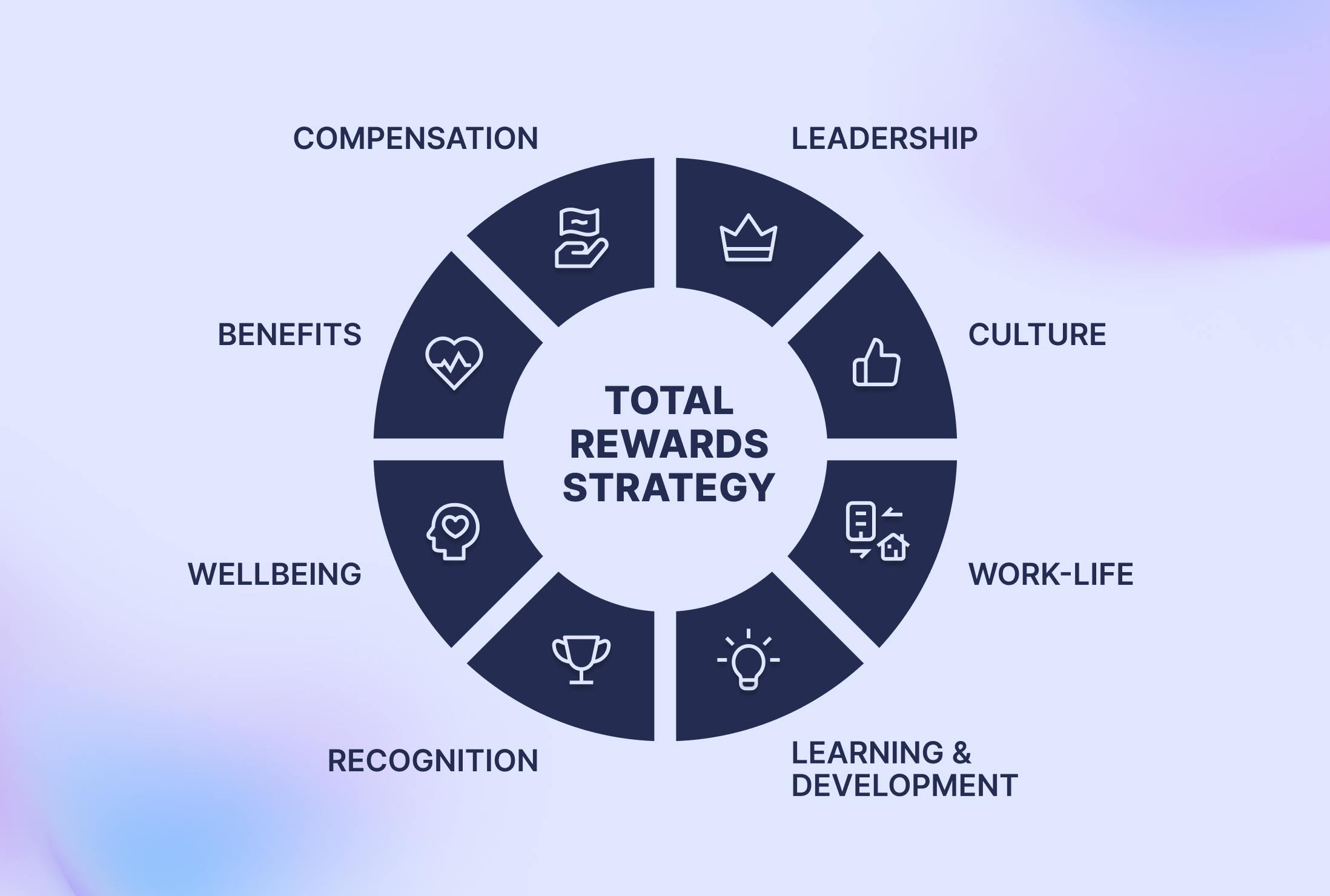- What is a reward philosophy and why do you need it?
- What's the difference between a reward philosophy and an employee value proposition (EVP)?
- How is your reward philosophy connected to company culture and values?
- What should a reward philosophy look like?
- Q&A: Fair pay is not the same as equal pay
- What are the common mistakes when creating a reward philosophy?
- Tools to help with crafting the right reward philosophy
How you reward people is one of the most strategic and expensive decisions you make as an organisation. Which is why People leaders today invest a great deal of time and effort in crafting their compensation and total reward strategy. From benchmarking, to defining salary bands, to outlining benefits and perks – a reward philosophy is a physical reflection of your company’s beliefs and values.
In the People Masterminds podcast, hosts Kristel Moedt and Eveliese Luiting break down what a reward philosophy is and why it’s so important for companies to have one. They’re joined by guest speakers Jodi Slomp, VP People at Mollie and Lucas Sondelski, Director of Reward at Personio, who also bring their experiences around reward philosophy to the table, exploring how to create a valuable philosophy that acts as your foundation, which you can then build on over time.
What is a reward philosophy and why do you need it?
A reward philosophy is a document that articulates what your company believes when it comes to rewarding people. A reward philosophy document can vary in format and the level of detail it goes into. For example, it may include company beliefs and values around salary, bonus and equity, or it could also cover additional compensation elements such as benefits, work-life balance, and holidays.
A reward philosophy is also a reflection of a company’s value proposition. According to Jodi Slomp, VP People at Mollie, it’s also “important to look at a reward philosophy holistically, outside of just benefits on paper. [A reward philosophy] should help you identify who the employees are that you want to hire, and how you want to retain those employees.”
For many companies, reward philosophies are not utilised in the most impactful way. A thoughtful, well-built out philosophy should act as a North Star for business leaders, a guide that shows how to attract and retain the right talent for the organisation and how exactly to reward them.

What's the difference between a reward philosophy and an employee value proposition (EVP)?
A reward philosophy can vary in the amount of detail it goes into, but it is designed to act as a usable guide for leaders wishing to compensate their employees. In comparison, an employee value proposition (EVP) is broader and less black and white. It houses information about how an organisation wants to market themselves to employees. It could include a plethora of things, such as hiring processes, employer branding, hybrid work policy, and culture and values.
How is your reward philosophy connected to company culture and values?
According to Lucas Sondelski, Director of Reward at Personio, a reward philosophy is a tool that reinforces a company’s culture.
“If there’s a mismatch there, then employees won’t feel it from what they’re receiving compensation-wise. The culture that you say it is is not going to be felt in reality.”
This can hurt motivation, retention, and quality of work. For example, if your company is a tech start-up and you’ve built a culture around innovation, then it’s important to offer compensation to people in a way that encourages this. This could be granting equity to employees. If people own a piece of the company, they are incentivized to ensure it succeeds in the long term.
Similarly, if your culture is all about collaboration, then you want to build your variable pay around driving those behaviours and actions. That means thinking carefully about rewards like individual bonuses, which could lead to a feeling that everyone is out for themselves.
It’s also a two way connection. Jodi Slomp says that “culture is made up of norms and language, and so it’s important to reflect those same norms and language back into your reward strategy and your value proposition. It needs to reflect the language of your organisation, tapping that back into your value and messaging is key.”
Both company culture and reward philosophy must work in tandem together, because they’re both the most fundamental ways for employees to understand the values of your organisation and feel connected to the vision, mission and values.
What should a reward philosophy look like?
On one hand, there is no right or wrong when it comes to a reward philosophy. There’s no master template to follow, and depending on what size organisation you are, the level of detail will also vary greatly.
But companies can implement best practices. According to Lucas, “a reward philosophy should be an organisation’s hymn book. The goal is to get all executives and managers singing the same values from the same hymn book.”
It’s important that employees have a feeling of consistency; that they can see it through leaders all saying similar things when it comes to reward and company values.
It’s also important to craft a reward philosophy that can scale alongside your company.
“Get clear on the strategy and where your company is going. Are you going to be remaining in a single market? Do you have a single product? Do you plan on expanding within Europe or multiple regions? All of those things will influence how you’re going to craft your reward document,” says Jodi Slomp, VP at Mollie.
Q&A: Fair pay is not the same as equal pay
When crafting a reward philosophy, understanding the difference between fair pay and equal pay is key. Fair pay needs to be equitable, which is different from equal.
But it can be tricky – and a murky grey zone to navigate. Should everyone in the same role have the same pay? How do you factor in years of experience, where the employee is located, or how long they’ve been in the role?
Lucas Sondelski, Director of Reward at Personio highlights the connection between compensation and employee engagement.
“If you pay me more money, I'll be happier. But this doesn’t translate to highest engagement. Companies with highest engagement are those who make the employees feel valued and fair. It’s those who do best at explaining what they set out to do philosophically and then they follow suit.”
People know why they’re paid what they’re paid, and it feels fair and they feel valued. It’s important that employees understand that the process of calculating compensation is fair.
What are the common mistakes when creating a reward philosophy?
According to Jodi, there are two big mistakes when creating a reward philosophy. Firstly, if you can’t explain your reward philosophy transparently with employees, then they’re going to find it difficult to get on board. Being transparent is fundamental to success.
Secondly, offering so many benefits that your employees come to expect it rather than appreciate it – otherwise known as the “golden cage.”
It’s important to explain the value of the benefits you offer in your reward philosophy so that your employees are appreciative of what they have access to alongside their pay.
Another common mistake when creating a reward philosophy is forgetting to take others along the journey with you. Drafting a philosophy is more than just a theoretical exercise, and it’s important to regularly loop in relevant stakeholders, get their feedback and iterate as you draft your reward philosophy.
On the flip side, understanding what a great reward philosophy looks like can help avoid common mistakes. For Jodi, Netflix stands out as the gold standard of reward philosophies. Not only does the media giant pay at the top of the market, but their reward philosophy ensures employees know the why behind what they’re paid.
Tools to help with crafting the right reward philosophy
A reward philosophy will include everything from salary, equity, benefits and perks, and more.
It’s therefore helpful to understand what’s being offered in the market when executing one. But how can you do that without having to physically ask your network what they’re doing at their company – a task that can quickly become lengthy.
“Ravio is amazing. It’s everything you could ever wish for as a People leader.”
This is where tools like Ravio come in. It offers People leaders a reliable and up-to-date window into the market to enable them to better understand what companies generally offer employees. This can range from health and wellness benefits, holidays, compensation, equity, and more.
By having this data, People leaders can create their reward philosophies to accurately reflect different geographies. For example, through Ravio you can see that a Direct Sales Manager (M2 level) earns £99,000 total compensation in the UK, split between base, variable and equity. Compare this to the same role in France, the individual would earn €94,000 (around £79,000) with different splits between base, variable, and equity.
When putting together different benefits in your reward philosophy, you can also see that while 56% of UK tech companies offer private healthcare, nearly all (99%) of French tech companies do. This highlights the importance of both understanding what other companies are doing, and also how to stay compliant with different European legislation.
Ravio offers real time data with amazing visualisations, making it the easiest and most user friendly benchmarking tool we use. Access to Ravio's live market data means no more headaches from delayed data sets or having to age compensation data, which has been a real friction point for us in the past.

VP People at Mollie
A well-defined reward philosophy is an essential tool for businesses wanting to make better, more consistent decisions that not only help drive fairness and equity, but also attract, retain, and motivate top talent within their market. It serves as a reflection of the company’s values and culture, providing a clear guide for compensation strategies. It’s important that People leaders craft a transparent reward philosophy, ensuring that employees feel valued and fairly compensated, while also aligning the reward philosophy with company goals and market standards.
Ready to refine your reward strategy? Book a demo with Ravio today to see how our tools can help you develop a competitive and effective reward philosophy.



